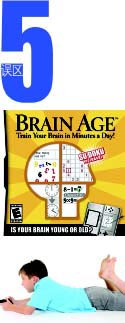|
|
|
谁在“误入益智歧途”:玩益智电子游戏http://www.sina.com.cn
2008年10月20日 14:39 新浪教育
 玩益智电子游戏
Playing Brain Age15) 玩益智电子游戏 Anyone who has ever begged their parents for a videogame system knows the standard lines of appeal (“You don't want me to have inferior hand-eye coordination, do you?”). Now kids can argue that some games may make them smarter. That's the promise of Nintendo's Brain Age, which claims to “help train your memory and keep your mind sharp” through reading exercises, math puzzles, and other mental gymnastics. After diligent effort, players routinely see their “brain age” plummet from, say, a sluggish 60 to a taut 30. But the improved performance may not be a sign of wit-sharpening. Many users start with little gaming experience, so it's not surprising that their scores improve—a phenomenon known as the practice effect. Sadly, there's no evidence that in-game gains translate to the real world. 每个曾经央求父母买 电子游戏机的孩子都会那一套标准化的请求说辞:“你们难道不想让我具有高人一筹的手眼协调能力吗?”现在,孩子们可以向父母争论道,有些游戏可以让他们更聪明。这正是任天堂公司的《大脑时代》的承诺,这款游戏声称,阅读练习、数学题及其他脑力体操,可以“有助于训练你的记忆力,保持思维敏锐”。通过勤奋的努力,游戏者将可以看到他们的“大脑年龄”骤降,比如从反应迟缓的60岁降到反应敏锐的 30岁。然而这一表现的改善并不代表着智力上的提升。许多玩家一开始并没有什么游戏经验,所以他们的游戏分数有所提升不足为奇——这是一种名为“练习效应”的现象。然而不幸的是,并没有证据表明游戏中成绩的提升会转换到现实世界中。
【发表评论】
|
||||
